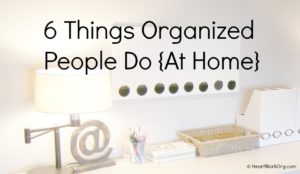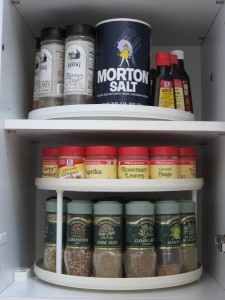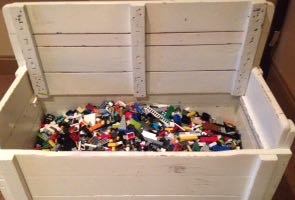 If you come to my house, you won’t see a perfect, magazine-ready home. But you will see a clutter-free, tidy space, unless the kiddos are having a LEGO-fest. Then all bets are off.
If you come to my house, you won’t see a perfect, magazine-ready home. But you will see a clutter-free, tidy space, unless the kiddos are having a LEGO-fest. Then all bets are off.
Want a more clutter-free home all the time? Take note of things that organized people do to keep their home organized.
While there are many more things that organized people do, these 6 things that organized people do might help you to stay more on track in your own home.
 Have you always wanted to organize some or all of your home, but you just can’t seem to get started? Below are some helpful hints to get you on your way.
Have you always wanted to organize some or all of your home, but you just can’t seem to get started? Below are some helpful hints to get you on your way.
1. Schedule it
First and most importantly, timing is everything. Pick a time of day when you have the most energy.
Keep in mind that if you’re tired, the effort will be over before you really make a difference.
Minimize interruptions as much as possible.
Be sure you’ve had something to eat before you start as you’ll need energy for decision making, moving, and lifting.
2. Ask why this is important?
Why has this project been nagging at you? Write down the reason. (I’m serious).
If and when you begin to have trouble with whether or not to keep or toss an item, you can simply ask yourself, “Does this item help or hinder the purpose I am planning for this space?”
3. Purge
There is logic behind minimizing and surrounding yourself with only the things you truly love and find useful.
Visual clutter is distracting, can hinder our attention, and is not conducive to a serene environment.
Depending on the purchase, the following years will require you to dust it, wash it, dry it, hang it up or fold it, maintain it, repair it, iron it, and, eventually, donate it.
4. Sort
Keeping similar items together will enable you to know how much you have of any given item, and it will eliminate unnecessary purchases.
If this is done in all areas of your home, it can add up to big savings.
5. Location, location, location
Everything we own should be stored in a carefully selected ‘home.’
Store items where you use them.
Staying organized needs to be easy. For example, removing a lid on a hamper so things don’t pile up on top of it.
Schedule time to address these areas so the simple act of putting things away is a breeze.
6. Procrastination
Clutter often adds up to postponed decisions. Whether facing a stack of paper or an intimidating project, ask yourself these questions:
-Are you hesitating because you need information? If so, make a list of what you need and who might be able to help.
-Are you simply a bit intimidated by the scope of the task? If so, break the task down into bite sized pieces.
-Can you commit to scheduling each ‘piece’ to your calendar?
7. Maintenance
A few minutes each day is all you need. I’ve been asked on many occasions, “Will my home stay organized after doing this work?” I like to use the analogy of weight loss when responding. With a little effort, and some careful decision making each day, you can maintain your achievement with pride.
–Taking 5 to 10 minutes per day to put things in their ‘home’ will keep your house in great shape.
–You’ll want to limit what’s coming in. Consider instituting a ‘one-in, one-out’ policy. Space is not infinite. Therefore, when buying a new piece of clothing consider letting go of an old piece.
–Resist impulse buys. Wait 24 hours.
–Make conscience decisions about the life cycles of your possessions. For example, let’s say that you decide magazines will only be kept for one month. You would throw the last issue out when the new issue comes in.
8. The payoff, celebrating!
Achievements and goals can be anti-climatic without reveling in them.
Having a home that is organized provides a surprising sense of pride, relief, and readiness.
You’ll have the freedom to host a spontaneous dinner party or barbecue at a moment’s notice.
This is the lifestyle that no accumulation of small possession can replace.
Whatever you do to celebrate, I suggest you reward yourself with experiences, not possessions. The experiences are the things we remember far longer.
Do you dread entering your laundry area because it’s filled with piles of dirty clothes and who knows what else? Now is a good time to make a clean, fresh start!
1. Visualize your ideal space.
· Picture how you would like the room to look and consider how it should better function.
2. Reduce the excess.
· Remove items that don’t belong in the laundry room and put them where they really should live.
· Eliminate items you don’t want (use up, share with others, donate, or toss).
3. Maximize the space.
· Install shelves or cabinets above and/or next to washer and dryer.
· If space allows, place a narrow rolling cart between your washer and dryer to store small items.
· Install a wall-hanging ironing board, hanging rack and/or folding table to save space.
4. Organize what you keep.
· Assign a home for each item, keeping similar items together.
· Keep frequently-used items close at hand and less-frequently used items higher or lower.
· Dedicate space for sorting dirty clothes; use bins or rolling carts to separate and contain whites, colors, delicates, and heavily soiled items.
6. Decorate the room.
· Hang artwork, put down a throw rug, purchase attractive hampers, etc. so you feel happy and peaceful in the room.
7. Develop a laundry schedule.
· Make doing laundry a ROUTINE – daily, every other day, weekly, etc.
· Make it as enjoyable as possible – fold laundry while watching TV, talking on phone, etc.
8. Get help from family members.
· Have family members empty pockets, pre-spot and put their dirty clothes in the hamper.
· Delegate the folding of clean laundry and putting clothes away.
9. Follow through!
· Complete the laundry cycle and put clothes away and have family members do the same.
· Reward yourselves with a treat when you’ve completed the process.
BONUS TIP #1: To have a truly clean start, take your accumulated laundry to your local laundromat and have them do the wash for you. Approximate cost = $1.00/lb.
BONUS TIP #2: Use Color Catchers (by Shout) or Color Grabber (by Carbona) when washing lights and darks together. They really do catch the color!
 “I’m cleaning out my parents’ home and coming across lots of items with sentimental value, how do I decide what to keep?” A friend asked me this question recently. Like so many of us will do in our middle years, she’s facing the dual challenge of grieving while dispersing all of her parents’ possessions. If she’s also the executor of her parents’ estate, she’ll have bills, paperwork, and the responsibility of staging and selling the home as well. It’s a lot to handle at a fragile time. The key to getting through this is to do it in waves, as you have the time and energy.
“I’m cleaning out my parents’ home and coming across lots of items with sentimental value, how do I decide what to keep?” A friend asked me this question recently. Like so many of us will do in our middle years, she’s facing the dual challenge of grieving while dispersing all of her parents’ possessions. If she’s also the executor of her parents’ estate, she’ll have bills, paperwork, and the responsibility of staging and selling the home as well. It’s a lot to handle at a fragile time. The key to getting through this is to do it in waves, as you have the time and energy.
Below are some suggestions on how to handle the process.
Remove items associated with your parents’ illness. Unless the death was sudden, there’s likely some assortment of medications and medical equipment. Getting these out of the way first will help you release the more recent painful memories and make space for joyful memories to surface. Check Earth911 for places that will accept these items. Some charities and thrift stores, such as Care & Share Thrift Shoppes in Souderton, PA accept medical equipment.
Locate and have the executor disperse any property according to your parents’ wills. If you can’t find some of the items, make a list and leave it in a prominent location. You’ll likely come across the remaining items as you continue to work through the house.
Give away or donate everyday items that don’t hold any particular sentimental value. Usually a fair amount of clothing, kitchen items, books, knick-knacks, small furniture, linens, and items in deep storage (attic/garage/basement) fall into this category. Continue to keep any individual items that you’re unsure about.
At this point, most of what will be left has a chance of being important to you or your family. If you have the luxury of time, invite your relatives to your parents’ home for a ‘claiming memories day‘. Disperse any remaining items mentioned in the will, and open everything else to be given away as keepsakes. The executor may want to set some parameters for this, such as taking turns. Many families find that storytelling naturally emerges from this process. You’ll probably have a lot of tears and laughter. Don’t rush; it’s a precious part of the healing process.
Can you give yourself a little more time at this point? If so, take a break. You’ve fulfilled the requirements of the will, disposed of unnecessary items, and preserved the most important memories. More often than not, some rest and a return to your normal schedule will restore your resilience, stamina, and creativity.
When you’re ready to return to your parents’ home, it probably won’t feel so emotionally charged or overwhelming. You’ll have the confidence of knowing that you won’t accidentally destroy a precious artifact, stumble across an unpleasant memory, or be overwhelmed with unimportant things. In short, you’ll be dealing with the middle ground of your parents’ possessions.
As you work your way through these remaining items, ask yourself a few questions:
-Do I need this to stage the house?
-If I take it home, would I definitely use it?
-Do I know anyone who could use this?
-What charities did my parents support? Do they accept donations?
You’ll likely end up donating or giving away most of these final items. Keep reminding yourself that you already saved the most important things. As the house empties, you may be sad. That’s healthy. Do the work that is easier for you and harder for your family, and ask them to do the same for you. Be gentle with yourself and each other.
Most importantly, cherish your memories as they are the most important thing you’ll keep.
 With being a mother of three boys, it comes as no surprise that we have a toy box ‘filled to the brim’ with LEGOs. That’s right, every color, shape, and size ever put on the market from 1998 until 2010. I have over 12 years of memories concealed in this toy box. So, when my boys suggested that we ‘get rid’ of the LEGOs, I admit that my heart sank a little bit. Immediately, I thought of the countless hours my boys spent imagining, creating, and building their creations and my constant amazement how these little blocks could hold one’s attention for so long. The actual toy box was my husband’s from his childhood. This in and of itself is a family ‘heirloom.’ So, does it make sense to discard this ‘treasure trove’ that I hold so dear? You would think that as a Professional Organizer it would be a ‘no brainer’…not so much.
With being a mother of three boys, it comes as no surprise that we have a toy box ‘filled to the brim’ with LEGOs. That’s right, every color, shape, and size ever put on the market from 1998 until 2010. I have over 12 years of memories concealed in this toy box. So, when my boys suggested that we ‘get rid’ of the LEGOs, I admit that my heart sank a little bit. Immediately, I thought of the countless hours my boys spent imagining, creating, and building their creations and my constant amazement how these little blocks could hold one’s attention for so long. The actual toy box was my husband’s from his childhood. This in and of itself is a family ‘heirloom.’ So, does it make sense to discard this ‘treasure trove’ that I hold so dear? You would think that as a Professional Organizer it would be a ‘no brainer’…not so much.
Do I purge on a regular basis? Yes. Although it comes naturally to me, I do try and live what I so often preach to my clients. “If it is no longer useful to you, why not bless someone with what you are no longer using?” Well, every now and then, sentimentality wins out. I am as sentimental as the next person and treasure certain items dearly. That being said, every item cannot and should not fall under this category. So, how does one choose?
First, you should ask yourself if the item holds good memories and brings you joy. If so, find a spot in your home to enjoy this treasure. Over the years, I have been gifted with many items from family, but have only kept what is useful to me. Take for instance your grandmother’s china. Maybe you have another set of fine china that appeals to you. If this is the case, donate or gift your grandmother’s set to someone else.
Second, take your storage space into consideration when deciding on what to keep. It does not take long for clutter to accumulate, and there is nothing worse than living in a cluttered environment. Also, if you can’t find the treasures when you want to use them, why hold onto them in the first place?
So, you’re probably wondering if I still have the white, wood toy box. The answer is yes! While my boys obviously don’t partake in building with LEGOs any longer, I have had on occasion, certain visitors who have enjoyed them. Also, it is located in our basement that was once our ‘toy room’ but has since been renamed the ‘workout’ room. Every now and then I get a glimpse of the toy box filled with LEGOs and my heart swells with wonderful memories of ‘years gone by.’
No Need to Hold onto Things for the Next Generation
When I give workshops, I am asked over and over again about what should be saved for children; if you don’t have children, you may be saving these things for friends or other family members. Many parents seem to think their children want what they have, so they hold onto items for when these children will appreciate these things. Items range from baby clothes to games to books to schoolwork to china to sterling silver and include tons of paperwork.
I have a client, with whom I have been working, whose father saved every personal and business record. He had checks from 1949 to the day he died. He had his and his wife’s medical records from the 1960’s (both of whom are now deceased), 8 estates that he had settled, and business records back to the 1960’s (including his stationery and business cards – from long retired positions). While everything was very organized and labeled, sorting through it has been a tremendous burden on his daughter.
Two 4-drawer file cabinets, one 2-drawer file cabinet, 2 desks, book shelves, and chairs had been used to store this paperwork. We are shredding and recycling 98% of these records. My client wants to go through everything to make sure there is nothing of value hidden away. We have talked about why her father would have saved all of this and cannot come to any satisfying conclusion.
Not only is there paperwork, but there are also items from grandparents and other relatives. Again, my client is going through all of this to figure out what she wants to keep and what she wants to donate or sell. Since her brother does not live in the area, she has to go through all these things by herself and save some things for him to go through, including his own items.
If you are saving things for your children/friends/other family members, please ask them if they want anything. If they say no, then either sell, donate, recycle, shred, or trash the items. There is no reason for you to hang on to this stuff, unless you really want it. If it is packed away and not being used, and no one in your family wants the items, give them away now so someone else may really be able to appreciate them.
Also, keep on top of your paperwork — shred or recycle old records. Settling an estate can take a lot of time. You can significantly speed up the process by getting rid of paperwork and any unused or unwanted items now.
This type of activity will not be one of your more fun things to do, but it sure will save time and heartache in the future. The lesson my client learned from all of this is to purge and continue to get rid of those things now that she no longer needs or wants. What are you going to do now with your unwanted and unnecessary items and paperwork?